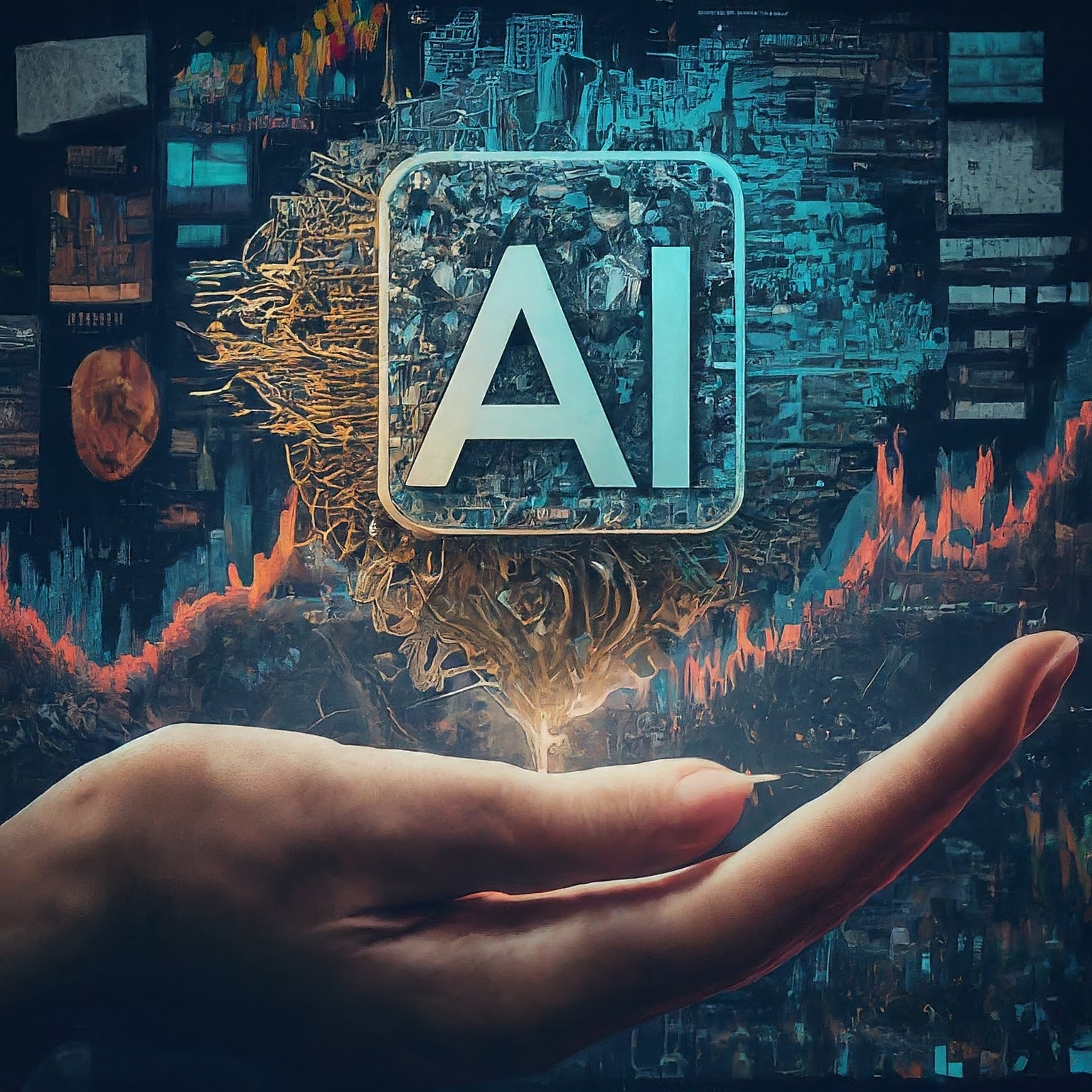The financial arena trembles Investment as a technological revolution unfolds. Artificial intelligence (AI) surges through the veins of investing, leaving a critical question burning: will AI become the ultimate investor, or just another algorithm waiting to be outsmarted?
Unveiling the Power of AI in Investment : Beyond the Hype
AI algorithms are no longer science fiction; they’re actively reshaping the financial landscape. Robo-advisors, fueled by AI’s analytical prowess, manage a staggering sum of billions in assets, autonomously analyzing data and executing trades with unwavering precision. Hedge funds, ever eager for an edge, are increasingly leveraging AI’s complex pattern recognition and market prediction capabilities.
The sheer potential of AI is undeniable. Proponents hail its ability to:
- Analyze vast swathes of data: Beyond human comprehension, AI sifts through oceans of information, unearthing hidden patterns invisible to the naked eye.
- React with lightning speed: Decisions are made in milliseconds, allowing AI to capitalize on fleeting market opportunities.
- Minimize risk: By crunching countless variables, AI strives to optimize investment strategies and reduce potential losses.
But before we crown AI the undisputed champion, let’s peer behind the curtain and examine its inner workings.
Beyond the Facade: Unveiling the Limitations of AI
While AI boasts impressive capabilities, it’s crucial to acknowledge its limitations and potential pitfalls:
1. Data Dependence: A Double-Edged Sword
AI algorithms are like sponges, soaking up data to fuel their insights. However, the quality of these insights hinges entirely on the quality of the data ingested. Garbage in, garbage out holds true here. Biased or incomplete datasets can lead to skewed predictions and disastrous investment decisions. Imagine an AI model trained on historical data rife with discriminatory practices; its investment recommendations could perpetuate, and even amplify, societal inequalities.

2. The Black Box Enigma: Transparency in the Age of Algorithms
Many AI models operate like “black boxes,” their decision-making processes shrouded in an opaque veil. This lack of transparency can raise concerns about accountability and trust. If you can’t understand how an AI arrived at a specific investment recommendation, how can you be confident in its validity? This “black box” problem demands solutions if AI is to gain widespread adoption in the investment world.
3. The Emotional Quandary: Can AI Quantify Human Sentiment?
The market is not just a cold, emotionless landscape of numbers and charts. It’s a dynamic ecosystem pulsating with human emotions, psychology, and unforeseen events. Can AI truly account for these unpredictable factors? Fear, greed, and market psychology can trigger sudden shifts that even the most sophisticated algorithm might miss. A model trained solely on historical data might fail to predict a “black swan” event, leading to significant losses.
4. Ethical Considerations: Ensuring Fairness in the Algorithmic Age
As AI algorithms evolve and become more complex, ethical considerations demand our attention. How do we ensure fairness and avoid algorithmic bias that could disadvantage certain groups? Can we prevent discriminatory investment practices that exploit societal inequalities? These are crucial questions that need answers before AI can be fully embraced in the investment arena.
The Human-AI Symbiosis: A Collaborative Future for Investing
While the idea of AI ruling the investment roost might seem like a dystopian movie plot, it’s unlikely to be the reality. Instead, a more probable scenario is one of collaboration between humans and AI. This “hybrid” approach harnesses the strengths of both worlds, creating a more informed and efficient investment landscape.
Humans bring to the table strategic vision, ethical oversight, and the emotional intelligence that AI currently lacks. They can assess the bigger picture, consider the ethical implications of investment decisions, and navigate the unpredictable terrain of human emotions within the market.
AI, in turn, can augment human decision-making by:
- Analyzing vast datasets: Sifting through mountains of financial data, identifying subtle trends and patterns humans might miss.
- Automating tedious tasks: Freeing up human time and energy for more strategic thinking and analysis.
- Providing real-time insights: Offering constant data-driven insights to support informed investment decisions.
This synergistic relationship has the potential to create a truly sentient market, where technology and human wisdom intertwine to generate informed and ethical investment decisions that benefit all participants.
Navigating the Sentient Market Landscape: A Look Ahead
The future of AI in investing is brimming with both potential and uncertainty. While its disruptive potential is undeniable, challenges and limitations persist. The true test lies in harnessing AI’s power responsibly and ethically, acknowledging its limitations, and fostering a collaborative approach with human investors. Only then can we create a truly sentient market that thrives on the combined strengths of technology and human ingenuity.
Expanding the Conversation: Delving Deeper into the Sentient Market
The initial exploration of AI’s role in investing opened doors to further inquiry. Let’s delve deeper into specific areas of discussion:
1. The Evolving Landscape of Regulation:
As AI’s influence in finance grows, regulatory frameworks need to adapt. How can we ensure fair and transparent use of AI algorithms, preventing bias and discrimination? Should there be specific regulations for “black box” models, requiring explainability and accountability? Open dialogue between regulators, developers, and investors is crucial to establish ethical and responsible AI practices in the financial sector.
2. The Human Factor: Upskilling and Reskilling the Workforce:
While AI automates tasks, it simultaneously creates new opportunities. How can we prepare the workforce for the evolving landscape? Upskilling and reskilling programs are essential to ensure that humans can adapt to new roles and thrive alongside AI. This could involve training in areas like data analysis, machine learning, and the ethical implications of AI.
3. Democratizing Investment: AI for the Masses:
AI has the potential to democratize investment, making sophisticated tools and strategies accessible to a wider audience. Imagine AI-powered platforms that provide personalized investment guidance, even for individuals with limited financial knowledge. However, concerns about accessibility and potential misuse remain. How can we ensure that AI-powered investment tools are inclusive and used responsibly?
4. The Ethical Dilemma: Balancing Profit with Social Impact:
Investment decisions have far-reaching societal consequences. Can AI be programmed to consider ethical and social factors alongside financial returns? How can we ensure that AI-powered investments contribute to a more sustainable and equitable future? This requires careful consideration of ethical frameworks and the development of AI models that prioritize positive societal impact alongside financial gain.
5. The Future of Algorithmic Trading: Beyond High-Frequency Frenzy:
High-frequency trading, dominated by algorithms, has been criticized for its potential to exacerbate market volatility and create unfair advantages. How can we develop fairer and more sustainable forms of algorithmic trading that benefit the broader market rather than just a select few? Exploring alternative algorithms and promoting responsible trading practices are key to achieving this goal.
The Road Ahead: A Collaborative Journey
The journey towards a truly sentient market, where AI and humans collaborate to create informed and ethical investment decisions, is paved with challenges and opportunities. By fostering open dialogue, upskilling the workforce, promoting responsible AI development, and prioritizing ethical considerations, we can navigate this complex landscape and unlock the full potential of AI in shaping a more sustainable and equitable financial future.
Remember, this is just the beginning of the conversation. Share your thoughts, questions, and insights in the comments below. Let’s work together to shape the future of the sentient market!
